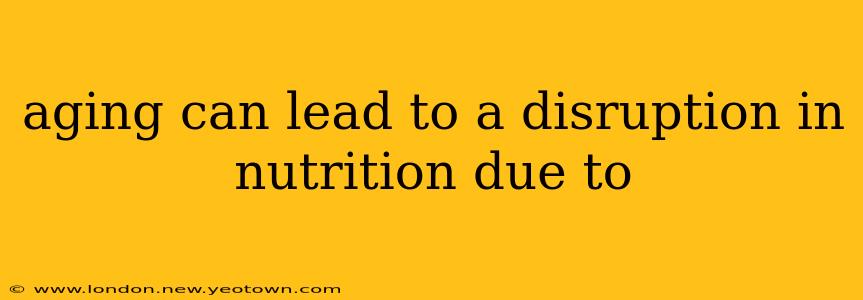Aging and Nutritional Disruption: A Story of Shifting Needs
We all know aging is a natural process, a beautiful journey marked by life experiences and wisdom. But alongside the silver hair and life's lessons, aging can bring changes that affect our bodies' ability to absorb and utilize nutrients. This isn't just about wrinkles and slower reflexes; it's a complex interplay of physiological shifts that can significantly disrupt our nutritional intake and overall well-being. Let's delve into this often-overlooked aspect of healthy aging.
Imagine Grandma Rose, a vibrant woman who once effortlessly prepared elaborate meals and enjoyed her garden's bounty. Now, at 85, she finds herself facing new challenges. Her once-sharp senses have dulled, making it harder to appreciate the aroma of freshly baked bread or discern the subtle taste of spoiled milk. This, in itself, is a significant factor affecting her nutrition.
This story isn't unique; it reflects the common experience of many older adults facing nutritional disruption due to age-related changes. Let's explore some key areas:
How does aging affect taste and smell?
As we age, the number of taste buds and olfactory receptors decreases. This reduction in taste and smell sensitivity can lead to a decreased appetite, making it difficult to enjoy food and potentially leading to malnutrition. Grandma Rose might unknowingly eat spoiled food or simply not find the pleasure in eating that she once did. This often leads to consuming less nutrient-rich foods and opting for blander options which are often less nutritious. Understanding this physiological change is crucial for adapting meal preparation and dietary strategies.
What are the common digestive issues experienced by older adults?
The digestive system also undergoes significant changes with age. Reduced stomach acid production can impair the absorption of essential vitamins and minerals, such as vitamin B12. Decreased motility in the gastrointestinal tract can lead to constipation, bloating, and discomfort, impacting food intake and overall nutrient absorption. For Grandma Rose, this could mean she avoids certain foods due to discomfort, further limiting her nutritional intake.
How does reduced mobility impact nutrition?
Physical limitations due to arthritis, reduced strength, or balance issues can make shopping for groceries, preparing meals, and even eating independently difficult. This reduced mobility can lead to reliance on convenience foods, which are often high in processed ingredients, unhealthy fats, and sodium, and low in essential nutrients. Grandma Rose, struggling with arthritis, may find it easier to order takeout than to cook a nutritious meal.
What about the impact of medications on nutrition?
Many older adults take multiple medications for various health conditions. These medications can interact with nutrients, either reducing their absorption or increasing their excretion. Some medications can also cause side effects that affect appetite or digestive function, further complicating nutritional intake. It's crucial for Grandma Rose's doctor to review her medications and their potential impact on her nutritional status.
How do changes in metabolism affect nutritional needs in older adults?
Metabolic rate slows down with age, meaning the body requires fewer calories to maintain its functions. However, the need for certain nutrients, such as calcium, vitamin D, and vitamin B12, remains crucial for maintaining bone health, immune function, and cognitive health. This shift in metabolic needs necessitates a careful adjustment in dietary intake and consideration of supplements where necessary.
Addressing nutritional disruption in aging isn't just about fixing a problem; it's about maintaining quality of life and overall well-being. By understanding the physiological changes that impact nutrition in older adults, and by adapting dietary strategies and seeking professional guidance, we can support our loved ones in enjoying a fulfilling and nutritious life, regardless of age. Grandma Rose's story reminds us that healthy aging is an active process, requiring awareness, adaptation, and compassionate support.

